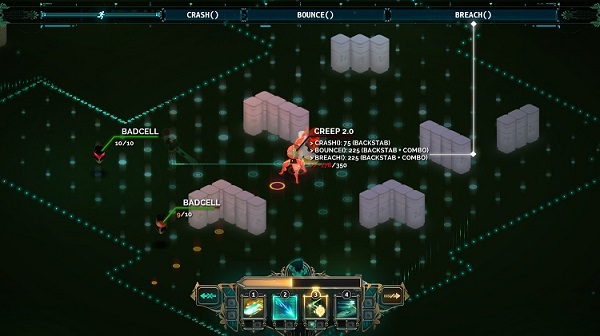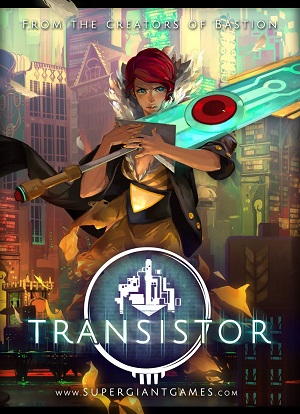 PLATFORM: PS4, PC (Reviewed)
PLATFORM: PS4, PC (Reviewed)
PRICE: $19.99
ESRB RATING: T
PUBLISHER/DEVELOPER: Supergiant Games
BUY IT FROM STEAM: Here!
BUY IT FROM PSN: Here!
The first impression made by Transistor, Supergiant Games’s sophomore release after putting themselves on the map with 2011’s Bastion, is how little time it wastes in getting itself going. Your first action as fallen-from-grace singer Red is to pull the Transistor, a talking sword-like device, out of the chest of an unknown man, and immediately embark on quest of revenge and discovery across the future-bohemian city of Cloudbank. No cutscenes, no tutorials other than Transistor’s suggestions; in an age where we come to expect lengthy, exposition-filled opening cutscenes this is a game that truly throws the player into a different world, not out of laziness (anything but, as we’ll come to in a minute) but of a genuine sense of mystery.
This isn’t really a surprise. Transistor is in several important aspects an evolution of their much-lauded debut, or at least a variation on its key aspects. Like Bastion, it’s an isometric adventure game focusing on arcade-style combat and linear progression; like that game, customizable offensive and defensive abilities are acquired and can be experimented with through a series of side challenges; and like Bastion, the plot focuses in large part on the mysterious circumstances that have led to the events of the game.
Cloudbank is a purely digital city, a place where people, architecture and even the weather are governed by programming – programming that can be altered at any time and where citizens can vote on tomorrow’s weather, or the colour of the sky. Unfortunately Cloudbank is being taken over by the Camerata, a secret society that operates like a combination of a terrorist organization and the Illuminati. The Camerata have, for unknown reasons, tried to assassinate Red using the Transistor, the dead man now inhabiting the blade having stepped in its way to protect her. As Red and the Transistor make their way across the city they battle the Process, a race of robotic intelligences apparently under the Camerata’s control, and it’s here that we see Transistor‘s most interesting new mechanic.
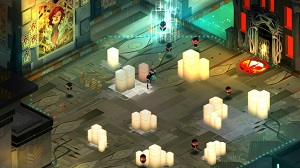 Red essentially has two modes of combat: real-time and Turn. real-time is self-explanatory: you run around, triggering various abilities (or Functions) as you go in an arcade-style fashion. Alternatively, you can freeze time with Turn and get an action bar which represents a second or two of real time. You fill the bar with attacks or movement, allowing Red to perform a lightning-fast combo, move to cover, or a combination of the two. The more powerful the attack, the more of the action bar it consumes, but at the same time you’ll probably want to use some of your action bar to get into cover as well: you can’t do anything when you go back into real-time until the action bar regenerates, and will be vulnerable unless you’ve manoeuvred yourself into a defensive position. Losing all your health gives you an ‘Emergency turn’ to clear all danger, but after that it only takes one shot to rob you of a ‘life’ – here represented by your Functions. Lose a Function, and you won’t be able to use it again until after the battle.
Red essentially has two modes of combat: real-time and Turn. real-time is self-explanatory: you run around, triggering various abilities (or Functions) as you go in an arcade-style fashion. Alternatively, you can freeze time with Turn and get an action bar which represents a second or two of real time. You fill the bar with attacks or movement, allowing Red to perform a lightning-fast combo, move to cover, or a combination of the two. The more powerful the attack, the more of the action bar it consumes, but at the same time you’ll probably want to use some of your action bar to get into cover as well: you can’t do anything when you go back into real-time until the action bar regenerates, and will be vulnerable unless you’ve manoeuvred yourself into a defensive position. Losing all your health gives you an ‘Emergency turn’ to clear all danger, but after that it only takes one shot to rob you of a ‘life’ – here represented by your Functions. Lose a Function, and you won’t be able to use it again until after the battle.
The combat system may sound unwieldy but is remarkably intuitive: so much so that Supergiant are able to drop it in your lap within the first couple of minutes of the game and have you holding your own almost instantly, with next to nothing in the way of direct instruction. It’s a masterclass in elegant communication of mechanics, scaffolded by clever design in the challenges pushing you towards trying out new approaches and techniques. This is useful,as the game has a surprisingly open build system, with Functions able to be equipped as usable abilities, buffs on already-mapped abilities or as passives. This results in a quite impressive range of possible builds that one could argue the game isn’t quite big enough to fully accommodate. Sure, you have the challenges to get familiar with familiar skills and a practice mode to experiment with combinations, but the propulsive nature of the story always means that your’re more inclined to find out what happens next than stick around and study.
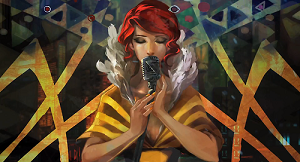 Transistor also retains a key characteristic of Bastion in the voice of actor Logan Cunningham, whose Tom Waits-esque bassy rumble as narrator Rucks helped make Supergiant’s debut an unforgettable experience. He’s less gravelly here as the titular sword, but equally as important to the game’s story: with Red mute apart from occasional flashbacks to her singing, Transistor’s one-sided conversations with her essentially amount to narration masquerading as dialogue. It mostly works, though it occasionally feels like the need to have Transistor constantly narrate is slightly at odds with the conversational style employed; there are a lot of redundant lines ‘Go here’, ‘It’s a news terminal’ and the like) which feel more like an excuse to keep Transistor talking than imparting useful information. No matter how cool Cunningham’s voice is, you find yourself at times tuning out from it which can be a problem when that sword is the game’s narrator and primary instrument for communicating just what’s going on.
Transistor also retains a key characteristic of Bastion in the voice of actor Logan Cunningham, whose Tom Waits-esque bassy rumble as narrator Rucks helped make Supergiant’s debut an unforgettable experience. He’s less gravelly here as the titular sword, but equally as important to the game’s story: with Red mute apart from occasional flashbacks to her singing, Transistor’s one-sided conversations with her essentially amount to narration masquerading as dialogue. It mostly works, though it occasionally feels like the need to have Transistor constantly narrate is slightly at odds with the conversational style employed; there are a lot of redundant lines ‘Go here’, ‘It’s a news terminal’ and the like) which feel more like an excuse to keep Transistor talking than imparting useful information. No matter how cool Cunningham’s voice is, you find yourself at times tuning out from it which can be a problem when that sword is the game’s narrator and primary instrument for communicating just what’s going on.
That said, Transistor‘s story’s (Or more accurately, the story of the consciousness inhabiting it) unfolds in a compelling and often touching way, Cunningham’s performance selling the melancholic sense of loss and perseverance that comprise the story’s melancholic spine – very much like Bastion‘s story, but on a much more personal level. While Bastion was the story of a civilization’s collapse with the protagonist as a magnet pulling a diaspora together, the societal collapse in Transistor is ultimately background to the story of two people destined to lose each other yet never actually part (or is that the other way round?). Other characters’ backstories become available in text forms they are ‘absorbed’ by the Transistor, but they only ever feel like supplemental to the central story.
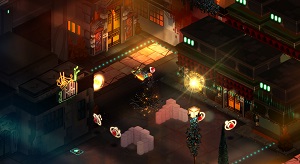 Transistor‘s scope is at once bigger and more limited than Bastion‘s and arguably less focussed, making it less immediate than its predecessor in a narrative sense. Similarly, the game’s techno-art-deco aesthetic is compelling if still close enough to Bastion‘s look to feel like a comfortable extrapolation rather than a departure (The two versions are essentially the same, though the PS4’s light bar pulses in time with Transistor’s voice if you still feel you need extra visual stimulation).
Transistor‘s scope is at once bigger and more limited than Bastion‘s and arguably less focussed, making it less immediate than its predecessor in a narrative sense. Similarly, the game’s techno-art-deco aesthetic is compelling if still close enough to Bastion‘s look to feel like a comfortable extrapolation rather than a departure (The two versions are essentially the same, though the PS4’s light bar pulses in time with Transistor’s voice if you still feel you need extra visual stimulation).
Because of this, Transistor feels like less of a slam-dunk experience, and overall less of a ‘crowd-pleaser’ than Bastion. It’s very much the classic sophomore release, building on an initial success while attempting to forge something new within that structure, yet skewing too similar to that first hit to entirely feel like its own thing. That said, it suggests enough to reassure that Supergiant are developing their skills in the right directions. Transistor is an evolutionary step but, it can’t be denied, a damned good one.
Rating: 




Out of a Possible 5 Stars
